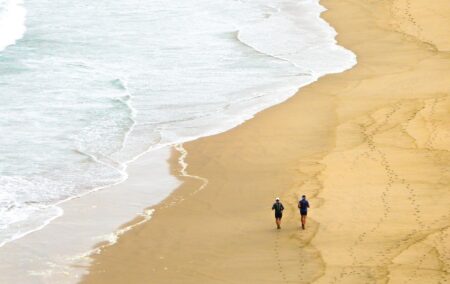The shutdown of international travel in response to the Covid-19 epidemic has been a disaster for South Africa’s tourism industry. International tourist arrivals have fallen to negligible levels and will not recover in time to save the 2020/21 summer season. This has thrown the focus onto the prospects for domestic tourism to at least partly fill the gap. This requires that serious consideration be given to opening the beaches to four-wheel-drive (4WD) vehicles once again.
This is not a call for a free-for-all on South Africa’s beaches. Few would dispute that some ecologically sensitive areas have benefited for the ban. The revival of the African Black Oystercatcher population at Lambert’s Bay is frequently cited.
4WDs were banned from South African beaches under all but the most restrictive conditions in 2001. Reviewing (and confirming) the ban in 2007, then tourism minister Marthinus van Schalkwyk made it clear that this had been done in order to actually boost tourism. The future, said Van Schalkwyk, was all about developing ‘the lucrative (international) eco-tourism market’. But this is precisely the market segment which has disintegrated under Covid-19 pressures.
The ban is a blunt instrument and, as such, poor regulation. It allows for only a few exceptions at the margin (NSRI launches, scientists, disabled persons). ‘Permitted events’ are also tolerated, but application processes and criteria are far from clear. The department did not choose to ban 4WDs from only ecologically sensitive beaches but rather all beaches in the entire country, without regard for variations in local conditions.
Fishermen and divers
The two communities hardest hit have been beach fishermen and divers. Both have traditionally used beaches to access distant ‘sites’ for their activities.
‘Few of us do beach driving for its own sake,’ argues one life-long fisherman. ‘My favourite fishing spot is seven kilometres from the nearest road access point. I’m too old to walk that distance,’ he adds.
A critical element in Van Schalkwyk’s armoury was a study of the ecological and socio-economic impact of the ban on beaches associated with the Greater St Lucia Wetland Park. The arguments of those who opposed the ban were ‘not based on fact’, the minister asserted. Many locals, however, believe that the study’s conclusions were pre-determined, while others say the scientific input was negligible. The study is not available on the department’s website.
Before Covid-19, St Lucia had been able to pivot to Van Schalkwyk’s preferred international ecotourism option. But, with no revenue from this market segment, local tourism operators suggest looking to South African fishermen and their families. That was the market which built the original industry.
‘Before the ban, over a long-weekend when the shad were running, we’d get anything up to 20 000 (local) tourists,’ one veteran tour operator says.
It would probably be inaccurate to suggest that the ban was not popular. 4WD beach driving had a reputation for destructive consequences, especially for seabird nesting colonies. But many of its proponents argue that this dark reputation was undeserved. ‘There were undoubtedly some drunken hooligans but they were a small minority,’ says one 4WD owner. ‘Not only was this easy to police but much of the policing was done by the 4WD community itself. We’re overwhelmingly people who like nature,’ he adds.
Quadbikes
Others point out that very little 4WD activity is conducted in the dunes where most beach-nesting birds lay their eggs. Some critics suggest that most damage is done by quadbikes, and make the point that these vehicles are usually rented out by large resort operators.
Local tourism cannot make up for the loss of revenue from international travellers, despite its enthusiastic endorsement by government. Foreigners accounted for more than two thirds of tourism spend in South Africa in 2018. Nevertheless, given the dire state of the industry, a more attractive offering to domestic tourists for the coming summer season is imperative.
[Picture: SolaGratia from Pixabay]
The views of the writer are not necessarily the views of the Daily Friend or the IRR
If you like what you have just read,support the Daily Friend

